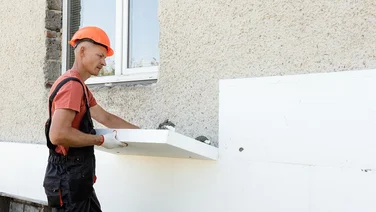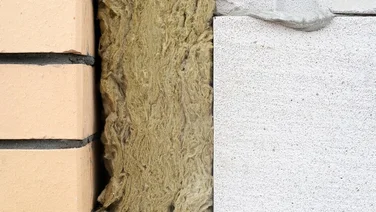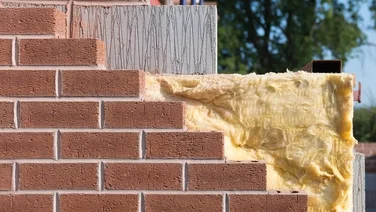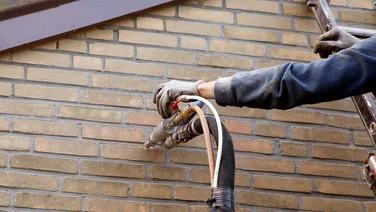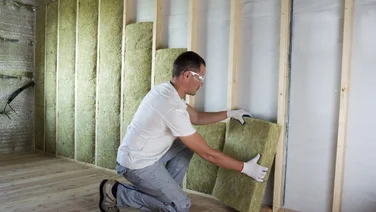We receive a small fee from trusted installers when you request a quote through our site. This helps us keep our content independent, well-researched and up to date – Learn more
- What government grants are available for insulation in 2025?
- What are the best government grants for loft insulation?
- What are the best government grants for cavity wall insulation?
- Are there any government grants for spray foam insulation?
- Local grants for insulation
- Am I eligible for free insulation grants?
- How can I get insulation cheaply without a grant or loan?
- How do I get started?
- Several grants are available in England, Scotland and Wales to help homeowners install insulation in their homes.
- These schemes could help you get insulation for free or heavily discounted (if you are eligible).
- Many of the schemes can also be used to install other measures like a new boiler or heat pump, too.
Times are tough for UK homeowners and renters right now. Rising costs of living, fuel pricing, and energy price caps are placing increased pressure on household budgets. Combine this with the recent axing of the Winter Fuel Payment, and 2025 is shaping up to be a difficult year for many, particularly those who are vulnerable.
While times might be tough for bill payers, there is something we can all do to cut the cost of energy and heating: insulating our homes. Thanks to a wealth of government grants available throughout the UK, many residents will be able to do so at a reduced price, or even for free, provided they know where to look for help.
To help you stay warm as the cost-of-living crisis wages on, we’ve rounded up some government grants available right now, including their funding and support packages, eligibility criteria and application processes.
If you’re interested in insulation, fill in our form to get a free insulation quote. Keep reading to find out if you are eligible for a loft insulation grant.
Grant | What it’s worth? | Who’s eligible? |
|---|---|---|
ECO4 | Up to 100% of the costs | People who meet certain benefits criteria |
Home Upgrade Grant (discontinued) | Up to 87% of the costs | This has now been replaced with the Warm Homes Local Grant. |
Home Energy Scotland | Interest-free loan for 100% of the costs | Residents in Scotland |
What government grants are available for insulation in 2025?
There are currently five national grants providing financial support for people wanting to install insulation in their home:
- Energy Company Obligation (ECO4) scheme
- Great British Insulation Scheme (GBIS)
- Warm Homes: Local Grant
- Warm Homes Scotland
- Nest (Wales)
Each scheme focuses on low-income and vulnerable households, which would benefit most from this financial support.
We’ve outlined the schemes’ key details below, including what’s covered, who’s eligible and how to apply.
Energy Company Obligation (ECO4)
The most popular grant that helps people lower the cost of insulation is the Energy Company Obligation (ECO4).
The government scheme places an obligation on energy suppliers to fund and deliver energy efficient solutions to homes across England, Scotland and Wales. If you’re eligible for ECO4, the scheme can cover up to 100% of insulation costs, and also offers funding for reusable energy systems such as solar panels and heat pumps.
The grant helps cover a range of insulation types, including loft, cavity wall, underfloor and room-in-room insulation. However, you may not get to choose what measures are installed.
The programme is currently due to end in March 2026.
Who is eligible for ECO4?
Applicants must receive one of the following benefits to be eligible for the ECO4 scheme:
- Income-based Jobseekers’ Allowance (JSA)
- Income-related Employment and Support Allowance (ESA)
- Income Support (IS)
- Pension Credit Guarantee Credit (PCGC)
- Working Tax Credit (WTC)
- Child Tax Credits (CTC)
- Universal Credit (UC)
- Housing Benefit
- Pension Credit Savings Credit (PCSC)
- Child Benefit
Anyone with additional Department of Work and Pensions (DWP) benefits will also have access to ECO4, regardless of whether they receive Universal Credit. You’ll need to live in a home with an energy rating of D to G (or E to G in some cases).
How to apply for ECO4
To apply to the ECO4 scheme, you simply need to contact one of the energy suppliers offering it.
You’ll then be invited to a telephone assessment, which involves answering questions about your income, whether you receive benefits and your property’s energy efficiency rating.
The installer will then arrange a date to visit your home and confirm whether it is eligible for the grant.
Great British Insulation scheme
The Great British Insulation Scheme (previously known as ECO+) is a government initiative that is designed to support an extra 400,000 households beyond those eligible for the ECO4 scheme.
It applies to homes in council tax bands A to D, with EPC ratings of D of G, and can cover up to 100% of insulation costs.
The government has stated that this grant will run until March 2026. It’s also allocated £1 billion to the project and claims it will cover up to 75% of the costs.
In theory, you can get most types of insulation under the scheme, including solid floor and solid wall insulation, but in practice it seems to be mainly loft insulation or cavity wall insulation that are funded, and possibly smart heating controls.
If you’re eligible, you’ll need to cover the remainder of any costs not covered by the scheme.
You can find out more about the scheme on our page: ECO+: Everything You Need To Know.
Who is eligible for the Great British Insulation Scheme?
To be eligible for the Great British Insulation Scheme, you must meet the following criteria:
- Be living in a home with an Energy Performance Certificate (EPC) rating of D or below.
- Be living in a home that falls within Council tax bands A-D in England or A-E in Scotland and Wales.
- You can be a landlord, resident homeowner or tenant (with landlord’s permission) to apply.
- You’re not eligible if you live in Northern Ireland, though there is other support available there.
How to apply for the Great British Insulation Scheme
Contact your energy supplier first to find out if you’re eligible. Then, if you are, they’ll match you with an installer who will assess your home for free. The installer will recommend what single piece of insulation is best for your home and then a date will be decided for installing it.
Warm Homes: Local Grant
Not to be confused with the Warm Home Discount Scheme, Warm Homes: Local Grant is an initiative designed to provide energy efficiency upgrades to low-income households in England, living in homes with poor Energy Performance Certificate (EPC) ratings of D to G.
The government grant replaced the Home Upgrade Grant (HUG) scheme, which was officially retired in March 2025.
The grant offers a variety of energy saving improvements to eligible applicants, including free wall, loft and underfloor insulation, and other upgrades such as heat pumps, solar panels and smart controls.
Who is eligible for the Warm Homes: Local Grant?
To be eligible for the Warm Homes: Local Grant, you must:
- Live in England
- Have a gross annual household income of £36,000 or less, be a recipient of one of the following means-tested benefits: Universal Credit, Pension Credit, Housing Benefit, Income-based Jobseeker’s Allowance, Income-related Employment and Support Allowance, Child Tax Credit or Working Tax Credit, or be living in a pre-qualified postcode
- Have an EPC rating of D, E, F, or G
It’s important to note that most social housing, self-build and new-build homes are generally not eligible for the benefit.
How to apply for the Warm Homes: Local Grant
The application process will depend on whether you’re a homeowner or a renter.
If you own your property, you can apply online through the GOV.UK website, or directly via your local authority.
If you’re a tenant in a privately rented home, on the other hand, you must apply directly through your local authority. Landlord support will also be required.

Warmer Homes Scotland
Warmer Homes Scotland can be used to get cheap or free home insulation, and cover up to 100% of the costs or offer a zero-interest loan if eligible
People in Scotland can install insulation through the government’s Warmer Homes Scotland scheme if they meet specific requirements.
Like the ECO scheme, Warmer Homes Scotland offers financial support to low-income and vulnerable households struggling to keep on top of energy bills.
Loft insulation is a popular choice in this scheme. During 2017/2018 and 2018/2019, 10% of installations through the Warmer Homes Scotland grant were loft insulation.
Who is eligible for Warmer Homes Scotland?
To qualify for the Warmer Homes Scotland scheme, you must meet all of the following criteria:
- Be a homeowner or the tenant of a private-sector landlord
- Live in the home as your main residence
- Have lived there for at least 12 months (unless in receipt of a DS1500 certificate)
- Live in a home with an energy rating of 72 or lower, which is not more than 230 square metres in floor size
- Live in a home that meets the living standard set out in the Housing (Scotland) Act 2006
- Haven’t received support for energy efficiency improvements through Warmer Homes Scotland funding in the last five years
On top of this, you’ll also need to meet at least one of the following criteria:
- Be of pensionable age, have no working heating system and receive a passport benefit
- Be aged 75 or older and eligible for a passport benefit
- Be pregnant and/or have a child under 16, and be eligible for a passport benefit
- Have a disability and be eligible for any level of Personal Independent Payment (PIP)
- Have a disability and be eligible for a high-rate Disability Living Allowance (DLA) (care or mobility component)
- Have a disability, receive a low/medium rate Disability Living Allowance (DLA) (care or mobility component) and be eligible for a passport benefit
- Be a carer in receipt of Carer’s Allowance
- Have been injured or disabled serving in the Armed Forces and be eligible for Armed Forces Independence Payment/War Disablement Pension
- Have an injury or disability from an accident or disease caused by work, and be eligible for Industrial Injuries Disablement Benefit
How to apply for Warmer Homes Scotland
If you’d like to get the ball rolling, call Home Energy Scotland on 0808 808 2282 or use the contact form to request a call or email back.
The organisation will then ask questions about your eligibility. If you qualify for the scheme, you’ll be referred to Warmworks Scotland (the Warmer Homes Scotland managing agent), who will offer a survey of your property.
Nest (Wales)
Wales residents who meet specific criteria will be able to get 100% off can install loft or wall insulation through the government’s Nest scheme.
Nest supports low-income and vulnerable people in Wales by offering free and impartial advice about home energy and funding for various home improvements. The scheme can also provide free funding for other home solutions to reduce your energy bills, such as new boilers or heat pumps.
If you’re eligible for the scheme, Nest will recommend a range of free appliances that you can install to make your home warmer and reduce energy bills.
Learn more: National Home Energy Survey Wales crowned the most climate-conscious part of the UK.
Who is eligible for Nest?
To be eligible for the Nest scheme, you must meet all three conditions below:
- Own or privately rent your home (not from a local authority or housing association)
- Have an inefficient home that is expensive to heat
- You or someone you live with receives a means-tested benefit or has a chronic respiratory, circulatory or mental health condition and has an income below the defined thresholds
Several means-tested benefits qualify, including:
- Child Tax Credit (income below £16,105 a year)
- Council Tax Reduction (exemption and discount do not qualify on their own)
- Housing Benefit
- Income-based Jobseekers Allowance
- Income-related Employment and Support Allowance
- Income Support
- Pension Credit
- Universal Credit
- Working Tax Credit (currently have an income below £16,105 a year)
How to apply for Nest
If you think you meet the eligibility criteria, call Nest on 0808 808 2244, or request a callback using the online form.
A Nest advisor will then ask questions to see if you and your property qualify for free home improvements. If your application is successful, an assessor will visit your home to see what energy efficiency improvements they can offer.
What are the best government grants for loft insulation?
If you’re interested in insulating your loft, you may be able to get a grant through GBIS, ECO4, Warm Homes: Local Grant scheme, Warmer Homes Scotland and Nest (Wales).
All grants cover up to 100% of the costs of loft insulation. However, this type of insulation isn’t always guaranteed. Energy suppliers will typically conduct a home assessment to determine which insulation measures will be the most suitable for each property.

What are the best government grants for cavity wall insulation?
If your home needs cavity wall insulation, you can get a grant through the GBIS, ECO4 Warm Homes: Local Grant scheme, Warmer Homes Scotland and Nest (Wales).
It costs slightly more to install insulation in cavity walls than in lofts, however, so it may not always be the default for grant providers.
Not everyone in the UK will be eligible, either. For example, renters are less likely to qualify for GBIS funding, and strict eligibility criteria apply for the rest of the grants.
Are there any government grants for spray foam insulation?
Although several government grants – including GBIS and ECO4 – provide insulation, spray foam insulation isn’t usually popular in these schemes.
This doesn’t necessarily mean that you can’t get spray foam insulation through government grants; it just means it might only be economical for some properties. It is important to note that spray foam can have drawbacks, including the risk that it will affect the value of your property and make it more difficult to remortgage.
The Energy Saving Trust found that Warmer Homes Scotland uses innovative measures to improve homes, some of which include spray foam insulation. For example, in homes with suspended floors, the scheme has used Q-Bot technology, which uses robots to spray insulation under the floor.
We have a dedicated page on the costs if you want to know more about spray foam insulation.
Local grants for insulation
Various local grants are also available to help pay for insulation at home. The schemes available will depend on where you live. We’ve given a few examples below to give you an idea of what to expect from local insulation schemes.
London Warmer Homes grant
Sadiq Khan’s Warmer Homes programme provides free heating, insulation and ventilation improvements for low-income households.
Londoners can get between £5,000 and £25,000 towards home efficiency improvements; the amount depends on your existing energy efficiency rating and the type of fuel your house uses.
To be eligible for this scheme, applicants need to:
- Live in Greater London
- Own or rent their own home (landlords can apply as long as the tenant is eligible)
- Receive a qualifying benefit or be on a low household income
- Meet maximum energy efficiency and household income requirements for the Sustainable Warmth element
Nottingham Healthy Housing Service
The Healthy Housing Service funds a range of home-energy improvements for people over 60 and families with young children at risk of cold-related illnesses in Nottingham and surrounding areas.
Through the scheme, people can get insulation installed either for free or at a heavily subsidised rate, along with boiler checks and advice on switching energy suppliers.
Am I eligible for free insulation grants?
Depending on the scheme, you can get free insulation (and other energy efficient measures) if you fall into one of the following two groups:
Low-income group
You might be eligible for multiple energy efficient improvements through schemes, such as ECO4, if you meet the following conditions:
- You own your home or, in some cases, rent from a private landlord.
- Your home has an energy performance certificate (EPC) rating of D or lower (EPC E or lower if renting).
- Someone in your household receives certain benefits, such as pension credit, universal credit, child benefit (depending on income limits), income support or housing benefit.
- You live in social housing or are recognised by your local council as having a low income (currently a total household income below £31,000 a year). You or someone in your home is considered vulnerable to the effects of living in a cold home.
General income group
If you don’t qualify as being in the ‘low-income group’, you may still be able to receive assistance with insulation through the Great British Insulation Scheme (GBIS). Even if you don’t qualify as ‘low-income’, you might still get help with insulation from the Great British Insulation Scheme (GBIS).
If you meet the criteria, you could be eligible for free insulation, although you can only have one type installed (either cavity wall insulation or loft insulation).
It’s important to note that you might have to cover part of the costs, but you will be informed before any work begins.
To be eligible, all of the following must apply:
- You own or rent your home (either privately or through a housing association).
- Your home falls within council tax bands A to D in England or A to E in Scotland and Wales. You can check your home’s council tax band on the Government website.
- Your home has an EPC rating of D or below.
How can I get insulation cheaply without a grant or loan?
If you are not eligible for any of the grants featured here, there are other ways to insulate your home that won’t cost a fortune. One of the main ones is to install roof insulation yourself.
Rolls of insulation can be bought from DIY stores and installed relatively easily. Take the right health and safety steps. Wear a mask. Ensure there is good lighting. Also, make sure you have solid grounding to avoid falling through the ceiling.
Other measures include draught-proofing windows, doors and any unused fireplaces. This can be done relatively cheaply using off-the-shelf insulation strips.
Draughts are one of the major ways homes lose heat. Closing these areas can lower your bills and make your home cosier, especially in winter. Thicker curtains or thermal curtain liners can also help reduce draughts and heat loss. Rugs and carpets on the floor can also help your feet feel warmer.
Try local re-use platforms such as Freeycle, Freegle and Olio. You might be able to get hold of unwanted rugs or carpets without having to pay a thing.
If you do need insulation, consider financing or payment plans if you’re still struggling with the cost. Some insulation companies offer zero-interest financing options or payment plans, allowing you to spread the cost into manageable installments.
How to avoid insulation grant scams
Unfortunately, as with any industry, some unscrupulous people will try to rip you off. If you consider taking advantage of the grants available, follow some basic tips to avoid being scammed:
- Research the installer – Always check the company’s credentials before engaging with them. You should also source and read reviews and testimonials, and validate any accreditations they claim they have (such as Trustmark).
- Be wary of cold callers – Be cautious if someone contacts you out of the blue offering insulation grants or services. Scammers often use cold calling to pressure people into making hasty decisions.
- Get a few quotes – Ensure you obtain quotes from several companies to compare prices and services. This can help you identify unusually high or low quotes, indicating a scam.
- Verify grant eligibility – There are lots of official-seeming websites, and scammers may claim you are eligible for a non-existent grant to lure you in. So, confirm whether you are eligible for a government grant by visiting official websites such as the UK government’s energy grants page..
- Avoid upfront payments – Reputable insulation companies under any of these schemes will not ask for large upfront payments before any work has been done. Be suspicious of any company that demands full payment up front or a large deposit.
- Read the small print – Carefully review any contracts or paperwork before signing. Scammers often hide unfavourable terms in the small print, or make vague promises.
How do I get started?
Hopefully, this article has helped you better understand the grants offered to people in the UK. If you’re not eligible for any of these schemes, you can still compare insulation prices.


